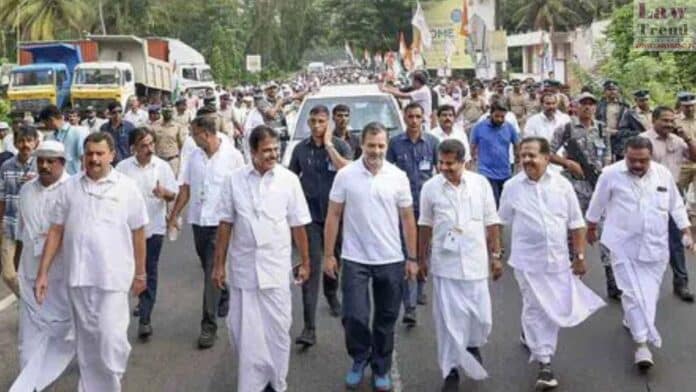A sessions court in Gujarat on Thursday said it would pronounce on April 20 its order on Congress leader Rahul Gandhi’s plea for a stay to his conviction in a criminal defamation case over his “Modi surname” remark.
After hearing arguments from both sides, additional sessions judge R P Mogera said he will pronounce the order on April 20.
A metropolitan magistrate’s court in Surat had on March 23 sentenced the Congress leader to two years in jail after holding him guilty for his remark “How come all thieves have Modi as the common surname” made during an election rally in 2019.

Gandhi, who was disqualified as Member of Parliament after the conviction, has filed an appeal before the sessions court against the verdict. He also prayed for a stay to the conviction in the meantime.
Lawyer argued that the trial in a defamation case over the Congress leader’s “Modi surname” remark was “not fair” and there was no need for maximum punishment in the case.
The lawyer argued during a currently underway hearing on Gandhi’s plea for a stay on his conviction in the defamation case.
A metropolitan magistrate’s court in Surat on March 23 sentenced Rahul Gandhi to two years in jail after holding him guilty for his remark “How come all thieves have Modi as the common surname”, made during an election rally on April 13, 2019.
Bharatiya Janata Party (BJP) MLA and complainant in the case, Purnesh Modi, in his reply filed earlier in the same court, had opposed Gandhi’s plea for a stay on conviction saying the Congress leader is a “repetitive offender” who is in the habit of making defamatory statements.
On Thursday, arguments from both sides commenced in the court of Additional Sessions Judge R P Mogera.
Arguing for Gandhi, senior advocate R S Cheema told the judge that the trial was not “fair”.
The judgement by the magistrate was “strange” because the trial court judge “made a hotchpotch of all the evidence on record”, Cheema said.
“It was not a fair trial. The entire case was based on electronic evidence, wherein I made a speech during elections and a person sitting 100 km away filed a complaint after watching that in the news…There was no need for maximum punishment in this case,” argued Cheema on behalf of Gandhi.
He also said that Gandhi’s unconditional apology to the Supreme Court (in Rafale contempt case) was wrongly attached with this case by the complainant.
Arguing against Gandhi’s plea for a stay on conviction, Purnesh Modi’s lawyer Harshit Toliya said his client felt offended because Gandhi had tried to defame all people with Modi surname through his remarks.
“He (Gandhi) was the president of the second largest party at the time of making the speech. His speech made a huge impact on the people of India and he also tried to sensationalise his speech,” said Toliya.
“In his speech, Rahul Gandhi spoke about Prime Minister Narendra Modi. But he didn’t stop there and went beyond it. He then said “Saare choron ke naam Modi hi kyu hai? Dhoondho aur bhi Modi milenge (Why are all thieves have Modi surname? If you search, you will find more such Modis). My client was hurt by this part of the speech and thus the complaint,” Toliya added.
He informed the court that Gandhi had refused to apologise for his remarks.
Toliya said Gandhi is facing similar defamation cases in the country and he is making such defamatory statements despite tendering an unconditional apology in the Supreme Court in the past (in the Rafale case).
Gandhi, who was the MP from Wayanad in Kerala before his conviction led to disqualification, made the “Modi surname” remark while addressing a rally at Kolar in Karnataka on April 13, 2019, during the Lok Sabha elections campaign.
Responding to Cheema’s argument about the jurisdiction (as Gandhi had made the speech in Karnataka), Toliya said although no objection was raised earlier during the trial before the magistrate, the issue was being raised now.
The arguments from the complainant’s side will continue after the recess. The state government, which has been made a party by the court, is also expected to make their submissions after the recess.
Gandhi has filed an appeal before Judge Mogera against the March 23 verdict. He has also prayed for a stay on the conviction in the meantime.
In his appeal, Gandhi has termed his conviction as “erroneous” and patently perverse.







